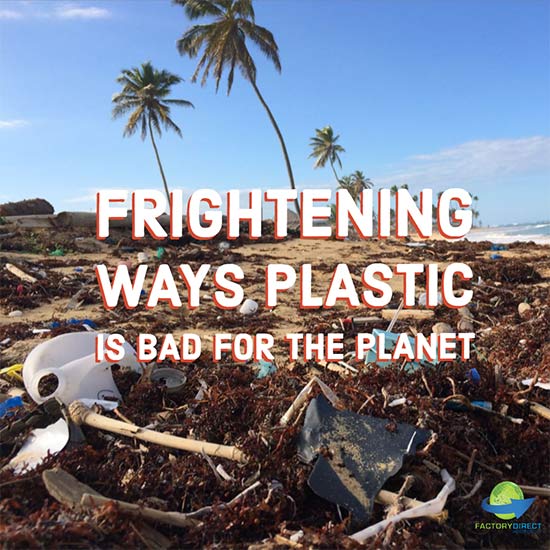What Your Brand Can Do to Help
In honor of Halloween, we would like to go over some of the most frightening ways that plastic bags create havoc on our oceans, the planet, wildlife and even for humans. While these real-life horror stories are frightening, there is a solution and you and your business can be a part of it! Eliminate the need and use of single-use plastic bags by making the switch to bags that can be reused! Here’s why you should #GoReusableNow for both your personal use and for your promotional marketing if you haven’t done so already.
1. Littering the Ocean
It is estimated that there are 14 billion pounds of litter in the world’s oceans, and as much as 80 percent of that trash is plastic. All types of litter pose various problems, but plastic is a particularly dangerous culprit. Plastic does not biodegrade, or rather, safely breakdown. When plastic litter ends up in the water it will continue to float around and create havoc.
Over time the plastic will break apart into smaller and smaller pieces. This is actually worse, because the smaller the pieces of plastic, the more challenging it is to remove from the water. Most of this litter comes from the land, and often there are very high concentrations of litter near coastlines.
2. Destroying the Planet
Plastic pollution is in the way and ugly to look at, but more frightening is the harm this trash causes the planet. Pollution destroys ecosystems, such as coral reefs. These fragile ecosystems support life and industry and the true consequences of damaging the coral reefs are not fully known.
3. Killing Wildlife
Plastic litter both in the oceans and on land negatively impacts animals that become tangled in the trash, ingest plastic or end up losing their habitats because of litter. Marine animals are more likely to suffer the consequences of plastic bag litter, however, animals on land do fall victim to plastic litter, too.
When ingested plastic litter can block an animal’s digestive system and cause death. If plastic is absorbed into tissue it can lead to cancer, birth defects, and additional health problems. These unnatural causes of death can have larger and more serious implications on food chains and entire ecosystems.
4. Jeopardizing Human Safety
The dangers of plastic extend to pretty much all living beings, including humans. Plastic has been found in the food chain and water which means it is possible for humans to consume incredibly tiny pieces of plastic. When ingested by humans, plastic can cause a variety of health problems.
Simple Tricks to Help
Plastic is bad for the planet, as well as the ocean, wildlife, and humans. While this is a huge issue there is a simple action that can help turn the tide of the plastic problem. Reducing your use of plastic will reduce the demand and the amount of litter in the world. Single-use plastic bags are a major threat and one of the easiest items to replace. Bags that can be reused do away with the need and use of single-use plastic. Reusable bags will not resolve the current problem, but it will prevent the problem from escalating.
Making the switch to reusable shopping bags can really make a positive impact. Reusable bags are also a great option if you’re looking for a promotional marketing product or a way to leave a lasting impression at a trade show or industry event. Customizing a reusable bag design turns the items into a mobile marketing force and your customers will promote your business and use less plastic when they shop.
Learn More
We have been helping our clients create custom bags that can be reused again and again for almost three decades. Needless to say, we’ve figured out some ways to streamline the process to save both money and time, and we pass these savings along to our customers.
Whether you want to learn more about creating custom reusable bags for your brand, when sales happen, or the benefits of using less plastic we are always here to help! Stay in touch to get the latest eco-friendly news.

